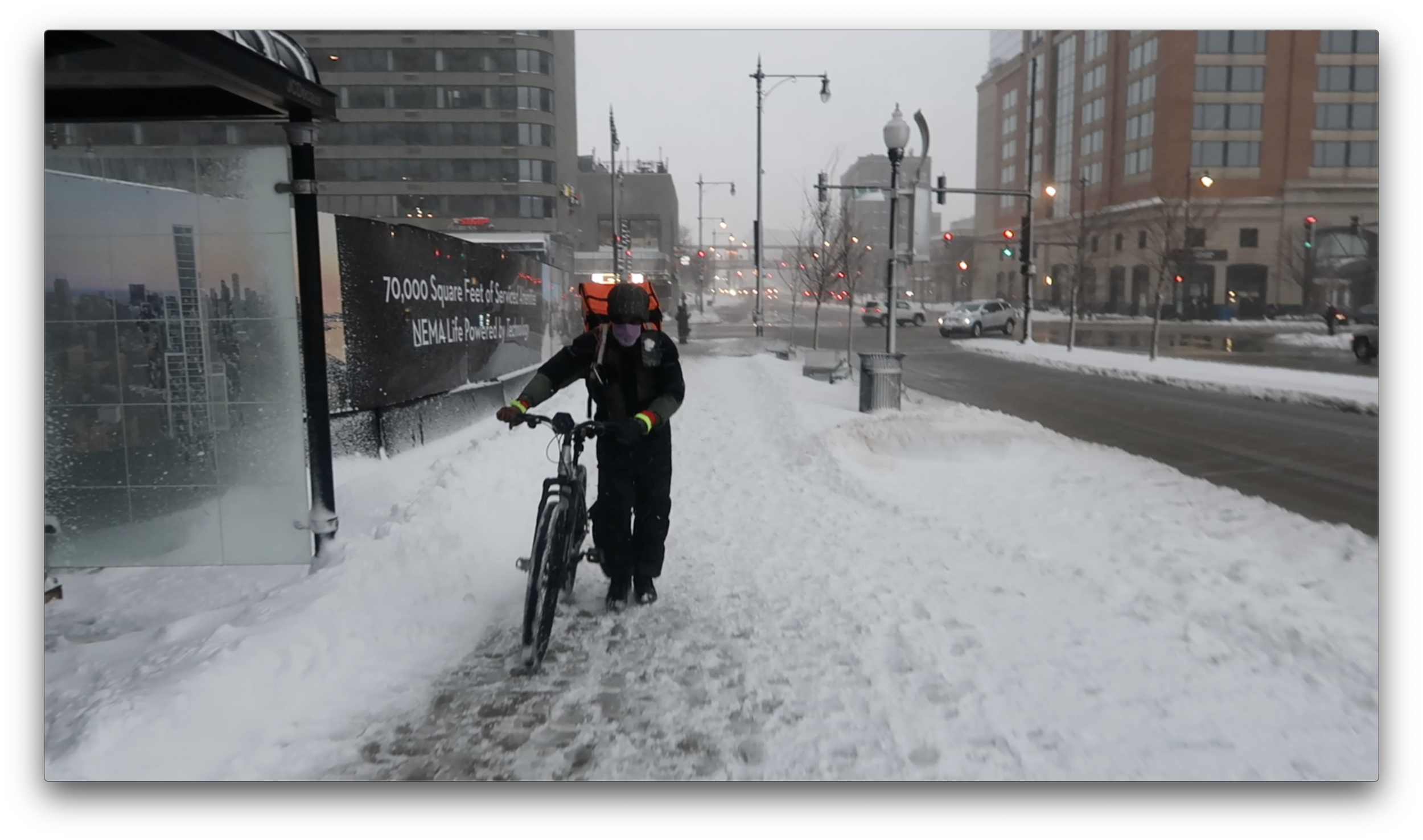HUMAN ⇄ GHOST : Food Delivery Drivers As Locals, Strangers, And Wanderers
⼈ ⇄ 幽灵:作为本地人,异乡人和游荡者的外卖员们
HUMAN ⇄ GHOST : Food Delivery Drivers As Locals, Strangers, And Wanderers
Documentary , 14:00mins
2021
Earlier industrial transformation and the epidemic have made more and more people become gig workers.
I interviewed some food delivery drivers from the Ubereats,. Their differences in race and immigration status have led to their polarized feelings about the job.
For local people of Chicago who work as Ubereats drivers, they consider this job as “*ghost work”, without social interaction: working all day and contacting real people for less than 5 minutes. The lack of social regularity and community makes people feel like a machine or a small parameter that keeps beating in the algorithm.
For the new Chinese immigrants, they are “ *strangers”, living in language and cultural barriers. Such ghost work, a job not required of speaking English, provides them with a shelter, becoming a strategy of living in the United States but away from American culture. On some non-algorithm-driven Chinese food delivery platforms, interesting acquaintance societies have been constructed.
Finally, I met a new immigrant from Bulgaria, he is now an Ubereats driver in London. He considers this as a job geographically unconstrained, allowing him to completely become a liquid individual, floating around the world. He recently decided to live in an RV and work as a delivery worker in different places, so as to travel around the UK and the world.
I hope that this work can provide multiple opinions of the gig platform from a global perspective, and I also ask, what kind of new possibilities now we have with the ghost work characterized by high mobility?
*Ghost work, from Ghost Work, Book by Mary L. Gray
*stranger, from The Stranger, Georg Simmel
⼈ ⇄ 幽灵:作为本地人,异乡人和游荡者的外卖员们
纪录片,14分钟
2021
科技革新,产业转型和疫情让越来越多的人成为了零工。
我先采访了多位在芝加哥工作的外卖员。他们在种族和移民状态的差别导致了他们对这份工作的两级感受。
对于在 The Ubereats 工作的芝加哥“本地人”来说,这是一份没有社交的“ *幽灵工作”:工作一整天,和真人接触的时间不到5分钟。社交与社群的缺失让人感到自己是一个机器,是一个在算法里不停跳动的渺小参数。
对于华人新移民来说,他们是“ *异乡人”,生活在语言和文化壁垒里,这样的幽灵工作为他们提供了一个庇护所,成为了在生活美国,却抽离于美国文化的一种方式。因为华人生活圈相对聚集,餐厅,外卖员,和客人,在一些非算法驱动的中餐外卖平台,已经构建出了有趣的熟人社会。
最后,我遇到了一位在伦敦的保加利亚新移民外卖员,他把送外卖理解成一种地理上不受拘束的自由工作,允许他彻底成为一个流动的个体。他最近决定住进房车里,在不同的地方从事外卖员的工作,借此周游英国以至于世界。
我希望这个作品可以提供全球化视角的对于零工平台的多元解读,并且提问,算法孕育了以高度流动性为特征的幽灵工作,为我们的生活提供了何种新的可能性?
* 幽灵工作, 引自 Ghost Work, Book by Mary L. Gray
*异乡人, 引自 The Stranger,an essay in sociology by Georg Simmel,



